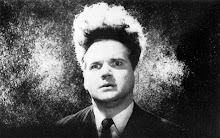Howdy folks,
After the rather hectic couple of weeks I’ve just had I decided I needed to relax. And how better to do so then with a good documentary series filled with war, political backstabbing and clashes of religious values and ideology.
For all you political history buffs out there I would strongly recommend the fantastic BBC documentary series ‘Iran and the West’ whilst it’s still available on the I Player. This series charts the problematic relationship between Western powers and Iran following the Islamic Revolution of 1979 in which America lost an allies in the Shah. The history is detailed and complex, yet the programme is clear and focused. It’s incredibly engaging and never confusing.
The contributors are excellent including former presidents Carter [US], Khatami [Iran] and Putin [Russia], intelligence agents from both sides amongst other high ranking officials. The programme shows in a fair unbiased manner the political manoeuvres and dealings of each country in response to each others interests within the region. For those interested in 20th-21st century international history ‘Iran and the West’ would prove essential.
* * * * *
For anyone seeking further reading this volatile regions’ history I recommend ‘Conflicts in the Middle East Since 1945 [3rd Edition]’ by Beverley Milton-Edwards & Peter Hinchcliffe.
A rather more lightweight yet ultimately more human documentary arrived in ‘Anvil: The Story of Anil’ [Dir: Sasha Gervasi]. At some point in the early 80s it seemed that “demi-gods of Canadian metal” Anvil were destined to become titans in heavy metal music. Their admirers include Lemmy [Motorhead] and Slash [Guns & Roses] and their sound acted as an influence on Anthrax, Metallica and Slayer.
Yet Anvil never reached the heights of fame achieved by these other bands. 20 years on this is still a cross to bear for childhood friends Steve ‘Lips’ Kudlow (vocals) and Rob Reiner (drums). The film catches them as they embark on a truly disastrous European tour.
You’d be forgiven for thinking that this may be some elaborative hoax, Spinal Tap’s shadow hangs over this film. Yet we continue to root for these lovably hapless 50 year olds through the pain and suffering that comes with artistic desire. It reminded me of ‘American Movie’ (1999) in that both have us hoping that these artists on the fringes of fame achieve the level of happiness and success they strive for.
This is a very funny, warm and rather touching film. If you’re looking for a true ‘feel-good’ movie forget Slumdog (despite the advertising claim I would hardly call it heart-warming) and catch this instead.
* * * *
Dirty Harry was also aging disgracefully this week in ‘Gran Torino’ [Dir: Clint Eastwood]. Walt Kowalski (Eastwood) is a bigoted veteran of the Korean War whose prejudice has shifted to the Asian community he believes is sullying his Detroit neighbourhood.
But the lonely Kowalski is brought out of his shell as he befriends the family next door. His sense of justice surfacing as he goes to their defence in the face of the gang that’s targeting the youngest son.
Eastwood plays Kowalski with aplomb; he’s bitter and racist yet melancholic with a sense of fairness. If all that I’ve said makes ‘Gran Tornio’ sound like a pretentious and heavy handed film, forgive me for it is not. The film is also very funny, most of the humour coming from the mouth of the gloriously un-PC and risqué Kowalski. Nick Schenk’s witty dialogue is given malevolent snarl form Eastwood’s Walt. If this proves to be Eastwood’s acting swansong then he’s going out on one of the most interesting and complicated characters of his career.
Gran Torino is a film that possibly requires repeated viewing in order to gain the subtleties within. As with Unforgiven (1992) it’s a meditation on retaliation and the true nature of violence and the guilt it brings. Like Unforgiven this film also uses Clint’s image as revenging outlaw/ruthless cop to highlight the futility of violence as a means to stopping other violence. Ultimately the film is about redemption and Kowalski does this through his accepting of his past deeds and in befriending the people he once had so much content with.
Unlike his recent Changeling (2008), Eastwood’s direction is not flashy; it’s refreshingly stark and solid. At no times does this become overly melodramatic or feels the need to strive for effect.
* * * *
Below is a link to one of the contributing factors towards my absence in the world of blogging. We need more hits.
http://www.youtube.com/watch?v=yaP18iOUtu4
Subscribe to:
Post Comments (Atom)

No comments:
Post a Comment